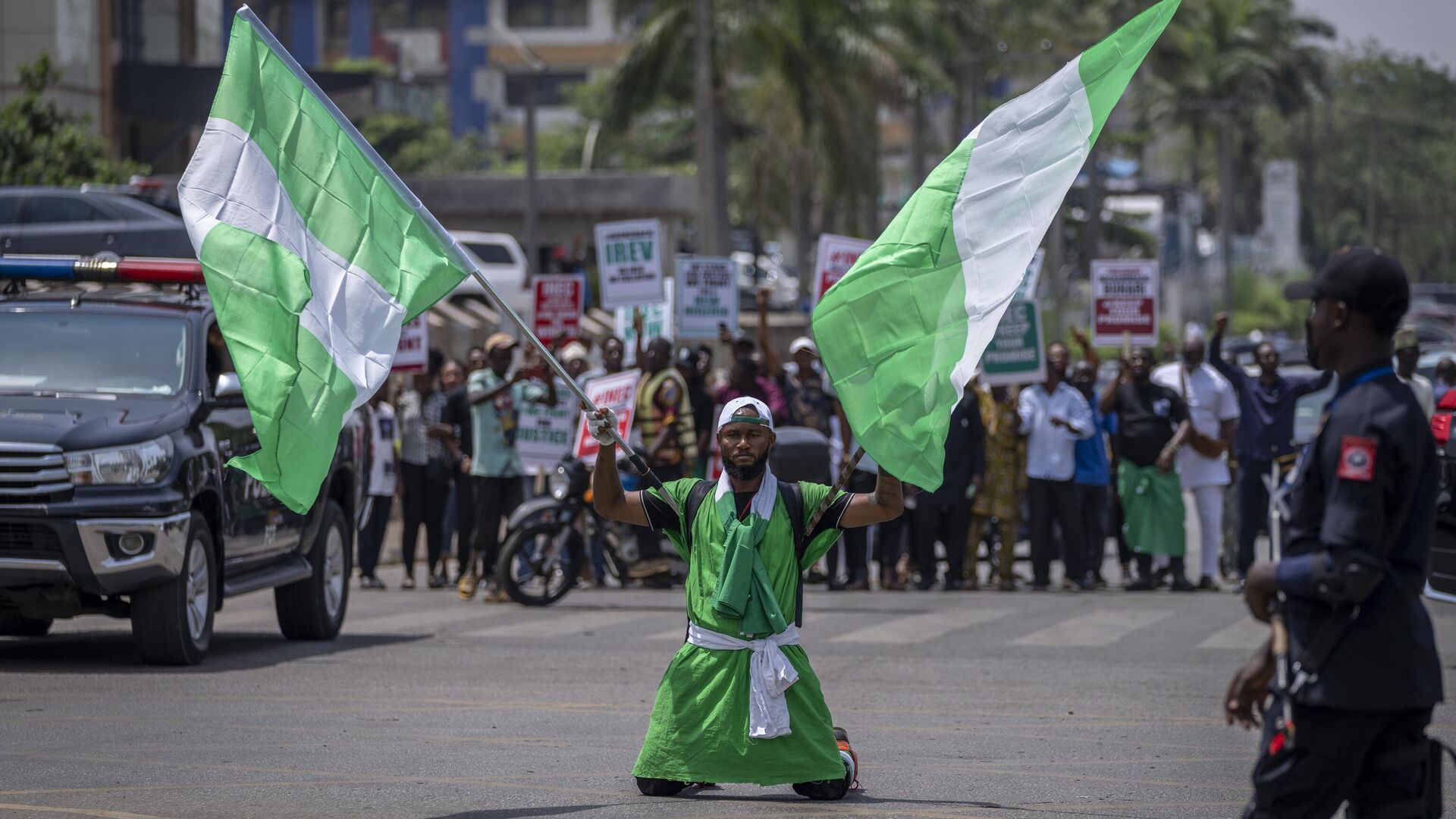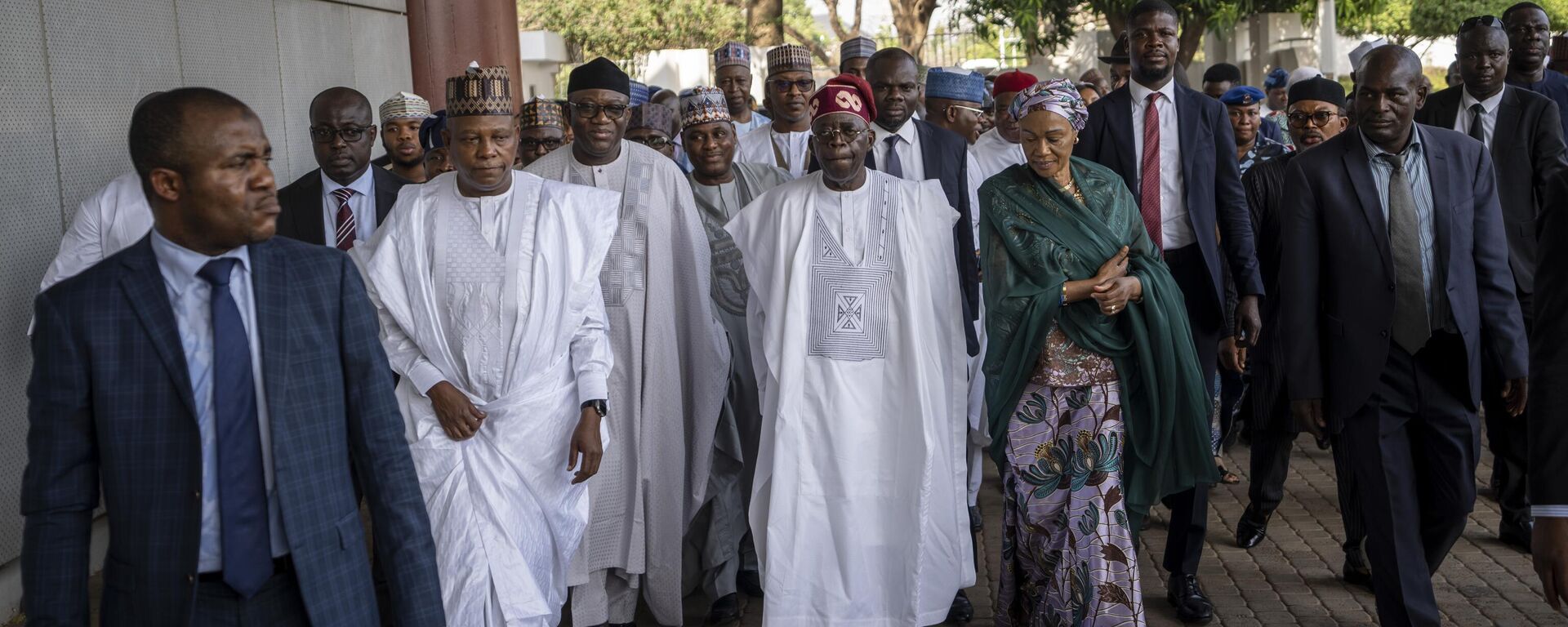https://sputnikglobe.com/20230309/nigerias-electoral-commission-reschedules-local-state-vote-following-court-ruling-1108204729.html
Nigeria's Electoral Commission Reschedules Local State Vote Following Court Ruling
Nigeria's Electoral Commission Reschedules Local State Vote Following Court Ruling
Sputnik International
The Nigerian Independent National Electoral Commission (INEC) has postponed state governorship elections by one week due to a court decision concerning the use of machines in voting tallies.
2023-03-09T10:14+0000
2023-03-09T10:14+0000
2024-03-11T10:58+0000
africa
west africa
nigeria
presidential election
politics
bola tinubu
atiku abubakar
peter obi
election
https://cdn1.img.sputnikglobe.com/img/07e7/03/09/1108206166_0:160:3073:1888_1920x0_80_0_0_ee3613471e4c13634cc2062f1d7bef44.jpg
The Nigerian Independent National Electoral Commission (INEC) has postponed state governorship elections by one week due to a court decision concerning the use of machines in voting tallies.The BVAS voting machines are the subject of a legal dispute over Nigeria's February 25 presidential ballot, won by ruling All Progressives Congress party candidate Bola Tinubu. The main opposition Peoples Democratic Party (PDP) and Labor Party, whose candidates took the second and third spots respectively, claimed the vote was marred by tampering.They argued that there were delays in the voting process and problems in uploading results through the BVAS machines, which were used for the first time in Nigeria during this year's presidential elections in a bid to provide more transparency in the elections.Labor Party candidate and surprise third place challenger Peter Obi sued to stop the reconfiguration of the BVAS machines so that his legal team could inspect them. He claimed that there were discrepancies between the results provided by the machine and the local manual count.Although the court ruling allowed the Independent National Electoral Commission (INEC) to reconfigure the voting machines in order to use them in local state governor and parliamentary elections, which were set to kick off in the weekend, the electoral agency decided to reschedule the election for Saturday, March 18.INEC assured that the data from the BVAS machines and its online database, IReV, used for uploading results from local polling stations, would be safely stored on a backend server and could be restored when needed in the legal process.The postponement of the state elections is not the first such incident in the history of Nigeria, given that INEC delayed the 2019 presidential vote for one week, citing logistic challenges.Last Wednesday, the Independent National Electoral Commission announced that Bola Tinubu, the ruling party's candidate, was the winner of the February 25 presidential elections. According to the commission, Tinubu garnered 8.8 million votes (36%), while the opposition Peoples Democratic Party's candidate and ex-vice president Atiku Abubakar, who was running for the country’s highest office for the sixth time, picked up over 6.9 million (29%).Meanwhile, Labor's candidate Peter Obi, who was supported by former Nigerian President Olusegun Obasanjo (1999-2007), amassed 6.1 million votes (25%).Both the PDP and Labor rejected the ruling party candidate's victory in the election, citing alleged violations in the voting process. Each of the two opposition contenders claimed victory in the election.For his part, Obi, who was in Abuja for Wednesday's court ruling, said he would go on challenging the election outcome in order to prove to the Nigerian people that he had won the February 25 ballot.Challenging election results is not a new practice in Nigeria since the end of military rule in 1999. In 2019, PDP's Atiku Abubakar legally challenged the ballot outcome after losing to incumbent President Muhammadu Buhari, citing alleged irregularities. Nigeria's Supreme Court dismissed the case after months of legal debates.
https://sputnikglobe.com/20230302/runner-up-candidates-party-in-nigerias-presidential-election-says-not-recognizing-result-1107962034.html
africa
west africa
nigeria
Sputnik International
feedback@sputniknews.com
+74956456601
MIA „Rossiya Segodnya“
2023
Muhammad Nooh Osman
https://cdn1.img.sputnikglobe.com/img/07e4/08/0e/1080170965_2:0:2050:2048_100x100_80_0_0_1de8233c87df0979e7e74f61b6ffacad.jpg
Muhammad Nooh Osman
https://cdn1.img.sputnikglobe.com/img/07e4/08/0e/1080170965_2:0:2050:2048_100x100_80_0_0_1de8233c87df0979e7e74f61b6ffacad.jpg
News
en_EN
Sputnik International
feedback@sputniknews.com
+74956456601
MIA „Rossiya Segodnya“
Sputnik International
feedback@sputniknews.com
+74956456601
MIA „Rossiya Segodnya“
Muhammad Nooh Osman
https://cdn1.img.sputnikglobe.com/img/07e4/08/0e/1080170965_2:0:2050:2048_100x100_80_0_0_1de8233c87df0979e7e74f61b6ffacad.jpg
nigeria's elections, nigeria state elections, nigeria, nigerian governor elections, nigerian assembly elections, nigerian parliamentary elections, nigeria elections 2023, nigeria elections 2023 results, nigeria state election 2023 date, state election 2023 date, nigerian independent national electoral commission (inec)
nigeria's elections, nigeria state elections, nigeria, nigerian governor elections, nigerian assembly elections, nigerian parliamentary elections, nigeria elections 2023, nigeria elections 2023 results, nigeria state election 2023 date, state election 2023 date, nigerian independent national electoral commission (inec)
Nigeria's Electoral Commission Reschedules Local State Vote Following Court Ruling
10:14 GMT 09.03.2023 (Updated: 10:58 GMT 11.03.2024) Muhammad Nooh Osman
Writer/Editor
Last week, the Nigerian Electoral Commission (INEC) declared ruling All Progressives Congress (APC) party candidate Bola Tinubu the winner of the country’s 2023 presidential race after gaining 8.8 million votes. The results were rejected by runner-up and third place challengers, who argued that the election "was marred by deliberate malpractices."
The Nigerian Independent National Electoral Commission (INEC) has postponed state governorship elections by one week due to a court decision concerning the use of machines in voting tallies.
The BVAS voting machines are the subject of a legal dispute over Nigeria's February 25 presidential ballot, won by ruling All Progressives Congress party
candidate Bola Tinubu. The main opposition Peoples Democratic Party (PDP) and Labor Party, whose candidates took the second and third spots respectively, claimed the vote was marred by tampering.
They argued that there were delays in the voting process and problems in uploading results through the BVAS machines, which were used for the first time in Nigeria during this year's presidential elections in a bid to provide more transparency in the elections.
Labor Party candidate and surprise third place challenger Peter Obi sued to stop the reconfiguration of the BVAS machines so that his legal team could inspect them. He claimed that there were discrepancies between the results provided by the machine and the local manual count.
Although the court ruling allowed the Independent National Electoral Commission (INEC) to reconfigure the voting machines in order to use them in local state governor and parliamentary elections, which were set to kick off in the weekend, the electoral agency decided to reschedule the election for Saturday, March 18.
"While the ruling of the tribunal makes it possible for the commission to commence the preparation of the BVAS for the governorship and state assembly elections, it has come far too late for the reconfiguration," INEC said. "We thank Nigerians and friends of Nigeria for their understanding as we continue to deal with these difficult issues."
INEC assured that the data from the BVAS machines and its online database, IReV, used for uploading results from local polling stations, would be safely stored on a backend server and could be
restored when needed in the legal process.
The postponement of the state elections is not the first such incident in the history of Nigeria, given that INEC delayed the 2019 presidential vote for one week, citing logistic challenges.
Last Wednesday, the Independent National Electoral Commission announced that Bola Tinubu, the ruling party's candidate, was the winner of the February 25 presidential elections. According to the commission, Tinubu garnered 8.8 million votes (36%), while the opposition Peoples Democratic Party's candidate and ex-vice president Atiku Abubakar, who was running for the country’s highest office for the sixth time, picked up over 6.9 million (29%).
Meanwhile, Labor's candidate Peter Obi, who was
supported by former Nigerian President Olusegun Obasanjo (1999-2007), amassed 6.1 million votes (25%).
Both the PDP and Labor rejected the ruling party candidate's victory in the election, citing alleged violations in the voting process. Each of the two opposition contenders claimed victory in the election.
"The PDP holds that its Presidential Candidate Atiku Abubakar clearly won the February 25, 2023 Presidential election having evidently scored the majority of lawful votes cast by Nigerians at the Polling Units," the Peoples Democratic Party said in a statement on March 2.
For his part, Obi, who was in Abuja for Wednesday's court ruling, said he would go on challenging the election outcome in order to prove to the Nigerian people that he had won the February 25 ballot.
Challenging election results is not a new practice in Nigeria since the end of military rule in 1999. In 2019, PDP's Atiku Abubakar legally challenged the ballot outcome after losing to incumbent President Muhammadu Buhari, citing alleged irregularities. Nigeria's Supreme Court dismissed the case after months of legal debates.




